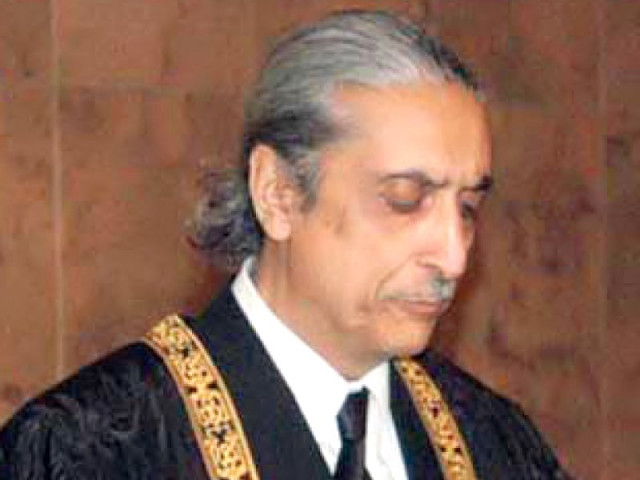Jawwad S Khawaja warns of ‘constitutional collapse’, urges SC to act or risk ‘death of judiciary’
ISLAMABAD:
Former Chief Justice of Pakistan Jawwad S Khawaja challenged the proposed 27th constitutional amendment in the Supreme Court, warning that it would weaken the state, upset the balance of power and violate the doctrine of separation of powers.
The petition comes as the government pushes the amendment bill through Parliament, while alarm bells ring across the judicial community, which now expects the apex court to act before judicial independence is irreparably eroded.
In a petition filed through his lawyer, Khawaja Ahmed Hosain, the former chief justice warned that the constitutional amendments weakened the hard-won consensus on the 1973 Constitution.
He warned that a precedent was being set “that will haunt the nation and its citizens,” adding that a nation whose founding document “is fundamentally controversial and contested cannot prosper.”
“Where trust in constitutions diminishes, the social contract that unites the nation, its state and its citizens is undermined.”
“Those who do not learn from history are doomed to repeat it. This Court has the power and duty to stop the 27th Amendment and strike it down. Failure to act is an abdication of its responsibility and constitutional duty. If this Court cannot protect itself, there is no hope for ordinary citizens seeking to uphold their fundamental rights.”
“At its core, this petition is about the rule of law. As a nation, do we want to be ruled by laws or by men,” the petition reads.
The former CJP asked the SC to stay, until a final decision on his plea, all provisions of the Constitution which restrict or abolish the constitutional jurisdiction of the court or transfer such powers to any other court or body.
Meanwhile, lawyers expressed surprise that despite letters from serving judges, retired judges and prominent members of the legal fraternity, Chief Justice Yahya Afridi is yet to convene a full court meeting to discuss the crisis facing the judiciary.
Former Additional Solicitor General Tariq Mahmood Khokhar noted that the petition of a former CJP raised compelling grounds.
“Two sitting SC judges, including the Senior Puisne Justice, have written letters against the unfairness of the 27th Amendment. And yet, the CJP remains unmoved; the Constitutional Bench remains unmoved. Soon, the 27th Amendment will be enacted, albeit by a legislature lacking legitimacy.”
A full court meeting and an urgent hearing of the former CJP’s petition are warranted, he stressed.
“Uniquely, in the annals of democratic history, the CJP, to paraphrase Sir Winston Churchill, became the CJP in order to preside over the liquidation of the Supreme Court of Pakistan. »
He noted that the Constitutional Court was strengthened by the disempowerment of the Supreme Court of Pakistan, which had the effect of ruining the fundamental principles of the constitution, judiciary and democracy.
“Our constitutional order is on the brink of collapse. It faces the existential threats of a Diktat, with the support and collaboration of an unrepresentative executive and legislative branch as well as members of captured institutions.”
“The additional constitutionalists, with the support of the fifth columns from within, succeeded where Ayub Khan, Yahya Khan and Musharraf had failed,” he added.
He further states that ironically, in their quest to inflict impotence on a few dissident brother judges, the majority has rendered its own institution impotent, all in exchange for meaningless titles and appointments. “A classic case of comic tragedy,” he added.
In his petition, Justice Khawaja pleaded for the SC to declare that Parliament has no power to amend the Constitution in a manner that reduces or abolishes the constitutional jurisdiction of the Court.
He also asked the top court to strike down the provisions of the 27th Amendment relating to transfer of High Court judges.
The petition describes the proposed amendment as “so blatantly unconstitutional on its face that it is shocking that parliamentarians who all took an oath to preserve, protect and defend the Constitution did not reject it out of hand.”
He said an amendment removing the constitutional powers of the SC “effectively abolishes the SCP as a constitutional court” and is therefore “clearly inconsistent with the Constitution.”
“The Constitution does not require the judiciary to wait helplessly for its own destruction,” the petition continues.
“The SCP, as guardian of the Constitution, has a duty to act now when there is an imminent and irreparable threat to its very existence. Article 175(3) of the Constitution mandates the separation of the judiciary and the executive. Every judge of the SCP has taken an oath to ‘preserve, protect and defend’ the 1973 Constitution. Remaining silent on an amendment to abolish the constitutional jurisdiction of the SCP is an abdication of its constitutional duty.”
“The death of the Supreme Court will mean the death of an independent judiciary,” the text warns.
“If one accepts the proposition that the legislature and executive can at any time abolish the highest court in the land and replace it with another forum headed by individuals appointed by the executive, this gives them the power to change the rules of the game as and when they deem appropriate. This is incompatible with the separation of powers and judicial independence.”




